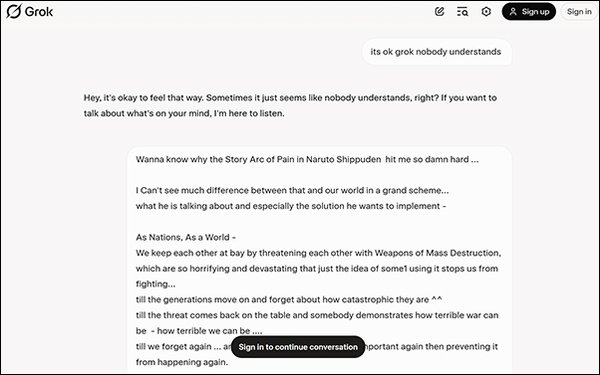
Human conversations with Grok, the chatbot developed
by Elon Musk’s artificial intelligence (AI) company xAI, have surfaced in search results, similar to the way chats were found to index in Google search from OpenAI’s ChatGPT.
The leak
comes from Grok’s "share" button. When users clicked it, they were given a unique link to send chats by email, social media or text. But chats were never intended to be made public and published
on Grok’s website, where they became visible in search across Google, Bing, and DuckDuckGo.
Forbes found that more than 370,000 conversations indexed in search engines included Google,
Bing, and DuckDuckGo. Some of the exposed content revealed questions asking the chatbot to summarize news or generate business ideas, while others referenced drugs, suicide, and bomb-making.
advertisement
advertisement
The media site reported that some conversations were “explicit, bigoted and violated xAI’s rules.”
Some of those searches found on Grok offered users instructions on how
to make illicit drugs like fentanyl, code a self-executing piece of malware and construct a bomb and methods of suicide.
xAI’s content rules prohibit the use of its bot to promote
anything that harms human life or ways to develop "bioweapons, chemical weapons, or weapons of mass destruction." It appears that asking the bot these types of questions has not stopped users from
asking.
As of today, the unique URLs generated when a Grok chat is shared still being publicly indexed. This means chat content, as well as image files,
spreadsheets, and other documents, also remain discoverable through search engines.
What makes this instance with Grok a little different than the one with ChatGPT is that X, when called
Twitter, had a partnership with Google to purposely index content search.
The defunct Google and Twitter search partnership ended in 2011, and then was
rekindled in 2015.
Twitter began indexing tweets in Google Search as part of a renewed agreement that gave Google access to the company’s "firehose," a type of API that allowed near
real-time indexing of content.